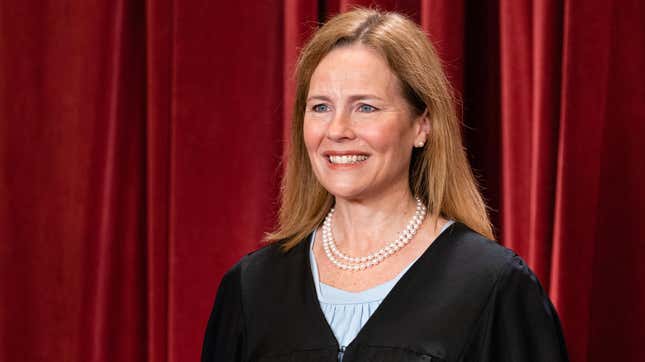
In a crucial Supreme Court ruling for the rights and sovereignty of Indigenous people on Thursday—the second suspiciously liberal SCOTUS decision of the session—Justice Amy Coney Barrett wrote the majority opinion upholding the Indian Child Welfare Act (ICWA) and shutting down challenges to Congress’ authority to enforce the ICWA.
The ICWA, passed by Congress in 1978, requires state courts to notify the tribes of Indigenous children amid custody disputes and allow the child’s tribe to intervene. The law also requires courts to make “active efforts” to prevent the separation of Native families and mandates that if a Native child is to be placed in a new home, courts must prioritize giving custody of the child to members of their extended family or tribe. Under ICWA, records of these custody cases must also be shared with the secretary of the interior.
In Haaland v. Brackeen, Barrett—joined by the three progressive Justices as well as Justices Neil Gorsuch, Brett Kavanaugh, and John Roberts—determined that contrary to a legal challenge posed by the Texas government and several foster parents, Congress has the authority to enforce ICWA. It’s a correct and important decision, as Indigenous communities face continued threats to their safety and existence. But nonetheless, the centering of Barrett—who has two adopted children of color—in the majority opinion has garnered a mix of surprised and uncomfortable reactions.
As Barrett’s conservative supporters so often remind us, the Justice is a mother of seven—a number that’s frequently shoved in our faces by anti-abortion activists as a crude political talking point. Two of Barrett’s children are adopted from Haiti, and the Justice has faced criticism from Black racial justice activists and scholars for the ways she’s spoken about her Black children in public, reinforcing stereotypes that adultify and dehumanize Black girls and boys. Others have been critical of how Barrett’s supporters have weaponized the mere existence of her Black children to deny that she or her policy stances could be racist—despite how transracial, global adoption itself has always been steeped in white supremacy and colonialism.
Adoptions from Haiti to the U.S. have been subject to particular scrutiny amid ongoing reports about the disorganized adoption system between the two countries resulting in Haitian children being kidnapped (in at least one case, by Christian missionaries from the U.S.) and trafficked.
A good Supreme Court ruling that protects Indigenous families and sovereignty is obviously worth celebrating regardless of who wrote the majority opinion. But I can understand why Barrett’s positioning at the center of the ruling is raising eyebrows. The imperialist violence that belies the global adoption system reflects the kidnappings and family separations of Indigenous children that ICWA was introduced to address. The law was conceived after decades of cultural genocide targeting Indigenous communities in the U.S. through taking Native children from their homes, denying them any access to their tribal cultures, and keeping them in the custody of violent, abusive “boarding schools.”
And today, even with ICWA, the policing of Native families by the U.S. government has persisted: Indigenous Women Rising previously told Jezebel that the regulation and criminalization of Native people’s pregnancies, in particular, has contributed to this. “There’s always been a history of Indigenous people being criminalized for not being fit parents... separating youth from their families and putting them in non-Indigenous households, as a way to overturn tribal sovereignty and culture,” IWR’s Nicole Martin said in 2021. Pointing to the case of Brittney Poolaw, an Indigenous woman imprisoned for alleged substance use that led to a stillbirth, Martin said the policing of Native pregnancies is about “taking people away from their communities with criminalization.”
The overturning of Roe v. Wade—which Barrett voted for last year—inevitably contributes to the policing and criminalization of pregnancy, a crisis that disproportionately impacts Native women and families. This has also exposed tribes to even greater safety threats, as non-Indigenous people have threatened to invade tribal land for abortion access.
This is all to say, the court’s majority opinion in Haaland v. Brackeen is a good thing. But Barrett, despite authoring said majority opinion, is hardly a savior to Native people and families, nor a crusader for justice in the adoption system.